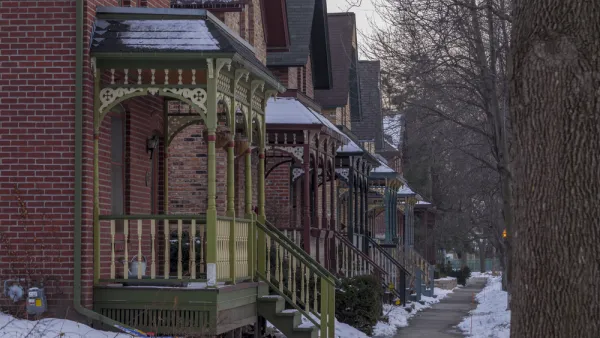After losing a court battle with environmental groups, the city must revert to the land use regulations in its 2030 plan.

The Minneapolis 2040 Comprehensive Plan, once hailed by housing reform advocates for its elimination of single-family zoning, has been officially shelved as a court deadline passed last weekend, reports Tommy Wiita for Bring Me the News.
The city now has to revert to its 2030 plan after environmental groups successfully challenged the plan in court under the Minnesota Environmental Rights Act (MERA), arguing that the land use changes in the plan would harm local ecosystems and pollute waterways.
“Some of the housing developments put forward under the 2040 plan will have to change under the old ordinances, causing some uncertainty for multiple projects,” Wiita adds, noting that, “since [Minneapolis 2040] was implemented three years ago, the city has seen an uptick in construction that has kept housing and rental prices more affordable at a time when inflation in other cities has skyrocketed.” The city says it will lose almost $10 million in funds already invested in affordable housing projects that will no longer be permitted.
According to an article by Susan Du in the Star Tribune, not all environmental groups agree with the ruling. “The Sierra Club, which filed an amicus brief in support of 2040, argued the plan's goals of increasing housing density along transit corridors would reduce carbon emissions by eliminating the need to own a car.”
FULL STORY: Minneapolis sets aside 2040 Comprehensive Plan after judge ruling goes into effect

National Parks Layoffs Will Cause Communities to Lose Billions
Thousands of essential park workers were laid off this week, just before the busy spring break season.

Retro-silient?: America’s First “Eco-burb,” The Woodlands Turns 50
A master-planned community north of Houston offers lessons on green infrastructure and resilient design, but falls short of its founder’s lofty affordability and walkability goals.

Delivering for America Plan Will Downgrade Mail Service in at Least 49.5 Percent of Zip Codes
Republican and Democrat lawmakers criticize the plan for its disproportionate negative impact on rural communities.

Test News Post 1
This is a summary

Test News Headline 46
Test for the image on the front page.

Balancing Bombs and Butterflies: How the National Guard Protects a Rare Species
The National Guard at Fort Indiantown Gap uses GIS technology and land management strategies to balance military training with conservation efforts, ensuring the survival of the rare eastern regal fritillary butterfly.
Urban Design for Planners 1: Software Tools
This six-course series explores essential urban design concepts using open source software and equips planners with the tools they need to participate fully in the urban design process.
Planning for Universal Design
Learn the tools for implementing Universal Design in planning regulations.
EMC Planning Group, Inc.
Planetizen
Planetizen
Mpact (formerly Rail~Volution)
Great Falls Development Authority, Inc.
HUDs Office of Policy Development and Research
NYU Wagner Graduate School of Public Service





























